The launch of this strategy document has been postponed due to the situation related to the coronavirus pandemic. This situation has created challenges for all of us: students, teachers, technical-administrative staff and managers. All of these have helped us move forward in the best possible way under the current conditions. In particular, we have focused on digital teaching, invested in equipment for this and tried to create the best possible digital teaching arrangements. This will be helpful in the time ahead.
The role of Mathematics
Mathematics is an integral part of our cultural heritage. The discipline has its roots in ancient civilizations and originates from the human need to keep accounts, meaning counting, adding up and mathematics in general. Astronomy (understanding the motion of celestial bodies), architecture and construction were behind the development of geometry, where concepts such as length, area, volume and angle came into play. Along the way, algebra also emerged so that one could work with symbols and more easily find rules, structure and abstractions. One could formulate and solve equations of different types. Later came problems from mechanics and physics that led to the development of mathematical analysis, where concepts such as derivation and integration became central. But the world is also uncertain, and mathematics was developed to calculate and understand coincidences. This led to combinatorics and probability theory and eventually statistics, with its many applications.
Mathematics has, after a long history, developed into a science that has a special position:
- Mathematical symbolic languages and concepts constitute a logical world that can be explored for contexts and truths. Problems can be formulated precisely by these and so often solved. Or maybe a problem has no solution; in that case one would like to show it!
- Mathematics is used in many areas. Some examples are calculations in technology and engineering, numerical methods for weather forecasting, modeling of waves in climate models, for strength calculation for ships and platforms, statistical methods in medicine and biological sciences, data science, and machine learning, with applications in virtually any field. The list can be made long.
- With today's and tomorrow's computer technology, mathematical calculations can be made unbelievably much faster than before; this provides completely new opportunities for developing better models, analyzes and decision bases in many applications.
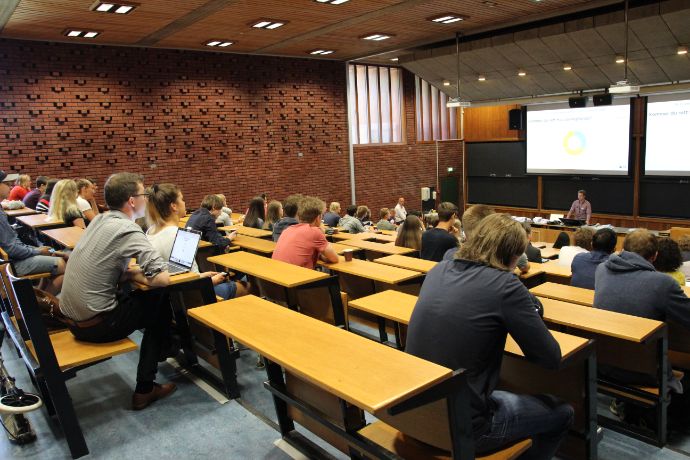
Our social mission is to possess and further develop mathematical competence the society can benefit from: We educate candidates with solid knowledge in mathematics: they have deep insight into mathematical theory, and they can analyze mathematical models, develop methods and program algorithms to solve problems. We conduct basic research with a long-term focus, and we have collaborations with the business world and the public sector. We work with dissemination of the discipline and engage us in the position of mathematics in primary and upper secondary school.
Our values
- We are bearers of a mathematical discipline tradition and we will carry the discipline forward, in research, education and outreached activities.
- We respect our students and welcome anyone who wants to learn math, whether it is as an auxiliary course or doing specialization in a course.
- We strive for good collaboration in teaching, supervision and further development of study offers.
- Central to us is long-term perspective, quality awareness and curiosity. We have ambitions in research and strive to be an international leader. Freedom of research is a fundamental value for us.
- We value and work for a good working environment for all our employees, permanent and temporary, built on respect for each other and for different disciplines. Gender equality and striving for a good gender balance are very important for us.
- We want to help ensure that courses in mathematics interact well with other disciplines at the university and in our surrounding community.
- Our department wants to contribute to the sustainability goals and appear with an environmentally friendly profile. This applies to both in the form of research projects (e.g. related to energy and climate models) as well as facilitate so that our employees can make environmentally friendly choices in their everyday work.

Strategic main points
Main goal: Our main goal is to maintain a strong academic department with a good breadth in mathematics: from theoretical mathematics to method research and modeling in statistics and mechanics. We want to be clearly visible in international mathematical research and create the conditions for free and basic research. Our students are very important to us. Education is a main task and we will work for a strong recruitment to our studies. We work to have attractive study programs, high quality teaching and to be committed lecturers and supervisors.
We will combine investment in theoretical mathematical research with more method- and modeling oriented research. We have big ambitions. The department will work so the theoretical, basic research shall receive the best possible conditions, including a good balance in the allocation of PhD positions. Within the more applied side of our activities, we will focus on method- and model-oriented research in good interaction with other environments at UiO and externally.
The faculty creates a new center, dScience, Center for Computational and Data Science. Our department was initiator of this and we have been centrally involved in the work with dScience. Going forward, the center will have great importance for both research and education and it will open up new opportunities for external contact and collaboration.
Research projects: A key task is to support and work to get larger research projects nationally and internationally, and to position ourselves for heavier EU applications (including the ERC). Such projects and external funding are expected to play an increasingly important role at the department. Our employees are encouraged to seek international cooperation and residency at relevant research institutes and universities, at the same time which we facilitate for visits by foreign researchers at MI.
Recruitment: It is a goal to recruit younger employees with high professional ambitions. All employees are expected to apply for research funding and disseminate their research. We want to balance strengthening and preserving strong professional environments towards recruitment for new fields and initiatives.
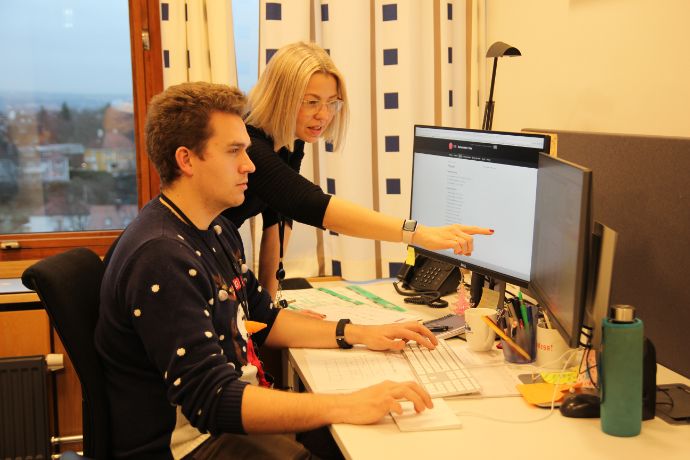
Interdisciplinary: We will focus on interdisciplinary, internally and externally, and ensure that our courses and efforts play a significant role in a larger context.
Education: Our teaching will cover classical theory and methodology, and at the same time draw lines to current research. We want research-based teaching where students both get to know certain aspects of current research and is also given the opportunity to contribute to this. Furthermore, we will organize conferences and summer schools with international participation.
External activities: The department wants collaboration with external environments on a broad front. In particular, we can highlight a comprehensive and exciting national program in mathematics funded by Trond Mohns foundation (TMS). This has given rise to a new environment in algebra at the department in addition to winter / summer schools, workshops and a national mathematics meeting. We will work to continue collaborating with TMS and other external institutions, as well as with UiO initiatives and centers such as UiO: life science, UiO: energy and dScience.
Students: We are concerned with involving students and student-run organizations in academic activities at the department. This applies especially to educational issues but also to processes of strategic art. The student council is an important point of contact between the department and students as they are represented on the board, as well as on committees for employment.
Environment: The department is a sum of efforts from many people, both scientific and technical / administrative employees. We are concerned with having a good working environment where individuals can experience both freedom and responsibility. We believe in the importance of a department characterized by diversity and with a good gender balance.
Infrastructure: The department has special needs within infrastructure for both research and education and the associated administration. This applies to IT-based infrastructure to support a dynamic environment where software for computational software, analysis tools, AI / artificial intelligence and more is an increasing part of the department's everyday life. This must be supported by a strong local IT administration and managed by the department. Another central infrastructure is the hydrodynamic laboratory which we want to expand with a larger pool and measuring equipment to support research and teaching in fluid mechanics and biomechanics.
About the Department
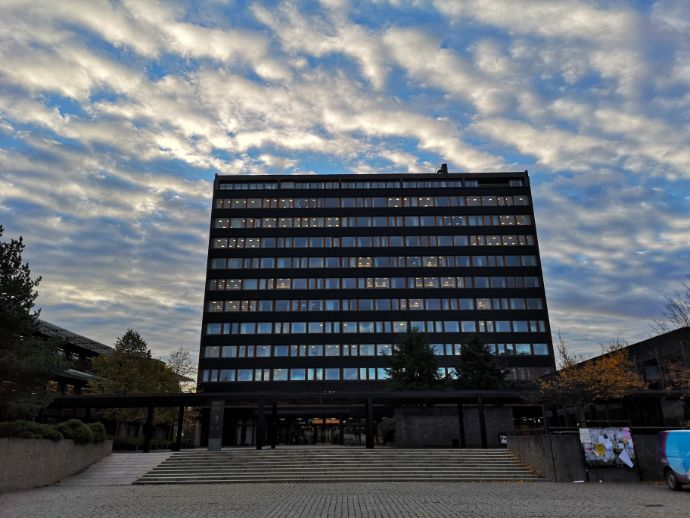
The Department of Mathematics is organized into six sections, as well as the technical-administrative staff. In 2020 we are in excess of 150 employees in total. Close to 90 of these are in temporary positions such as PhD or postdoc.
The department is led by a management group, and a management forum in which all section leaders are included. Bachelor- teaching goes partly across sections while master's / PhD teaching is linked to the different sections.
Academically, we conduct research and teaching fairly broadly in mathematical courses, with a main division into mathematics, mechanics and statistics. Despite the fact that these three areas are different, we see a development where the fields are more strongly linked to each other.
Sections
The Mechanics section works with theory, modeling and experiments for basic and industry-relevant phenomena within fluid and solid mechanics. One studies the fundamental physical processes for fluids and fluid movement based on the desire to understand, protect and improve the environment.
The Statistics and Data Science section is active in many theoretical and applied areas of statistics and Data Science: inference for high-dimensional data, survival and event history analysis, model selection and evaluation, non-parametric methods, hierarchical Bayesian modeling, time and space modeling, and general methodological research motivated by applications in public health, econometrics, genetics, biology and technology
The Risk and Stochastic section works with statistics, probability theory and stochastic analysis. The section develops new mathematical theory and new stochastic models, which in turn are used to measure, analyze and manage risk. The areas of application are in finance, insurance, energy and industry, there the section's analyzes contribute to a more efficient use of resources: financial, climate and nature.
The section Differential Equations and Computational Mathematics focuses largely on partial differential equations (PDEs), often in connection with applications in very different disciplines such as fluid flow, finance or astrophysics. Central to the research is the analysis of numerical methods for calculating approximate solutions. Furthermore, the department conducts research in geometric modeling and splines, as well as in matrix theory with links to algebra and convex analysis.
The section Algebra, geometry and topology researches basic questions in theory mathematics. Research is, among other things, in algebraic geometry with a focus on birational geometry, deformation theory, enumerative geometry, non-commutative geometry, tropical algebra, and more related topics. In addition, an extensive activity takes place in algebraic topology and algebraic K-theory, with applications in geometric topology. Motivational homotopy theory is an example of a homotopy theory that is developed from algebraic geometry.
The Several complex variables, logic and operator algebras section consists mainly of two research groups. One group works with complex analysis, most often with problems where several variables are included, but also with complex dynamics. The second group has operator algebras as its own main interest. This field, which is a branch of functional analysis, has its origins in the mathematics basis of quantum physics. The section also has a small group in logic, which researches within computability theory and complexity theory.
The technical and administrative section supports the activity in both education and research, IT operations and infrastructure in active collaboration with all our employees and in close collaboration with the students.
The Abel Prize
The Abel Prize was established in 2001 following a proposal from a working group at the Department of Mathematics. The department is closely related to the work on the award and related activities. A majority of the leaders of the Abel-Committee and Abel-board has been affiliated with the Department of Mathematics. The Abel-lectures are also organized every year on campus in collaboration with the University of Oslo. In addition, the department has throughout the years been closely linked to the work with the popularization of the award winner's works and fields.
School activities
The Department of Mathematics believes it is important to be informed about mathematics in school and to keep in touch with upper secondary school. This entails, among other things, that many employees participate with lectures on school-oriented events led by the University of Oslo; Academic-pedagogical day where teachers from Eastern Norway come to campus, UngForsk where students in 10th grade or Vg1 in upper secondary school come to meet academic environments at the university, or Open day where students at Vg3 can get acquainted with study opportunities at UiO at the same time as they can follow popular science lectures. In the latter two events, students associated with the department study programs also participate.
Education
Education is a main task for our department. We offer a wide range of courses in mathematics, statistics and mechanics, at all levels. We have the main responsibility for courses in mathematics at the bachelor level. These are included in various study programs at the faculty, such as programs in physics, chemistry, biological sciences, informatics and others.
We offer two bachelor's programs in mathematics:
Both programs offer specialization in mathematics, while combining with either informatics or economics.
We have five master's programs in mathematics:
- Mathematics
- Fluid mechanics
- Stochastic modeling, statistics and risk analysis
- Data Science
- Computational Science (two fields of study)
These programs have different academic facilities and provide a good breadth in our educational offer. The department sees it as an important task to offer teaching in mathematical courses for students in adjacent study programs and will keep on develop the offer in collaboration with associated academic areas.
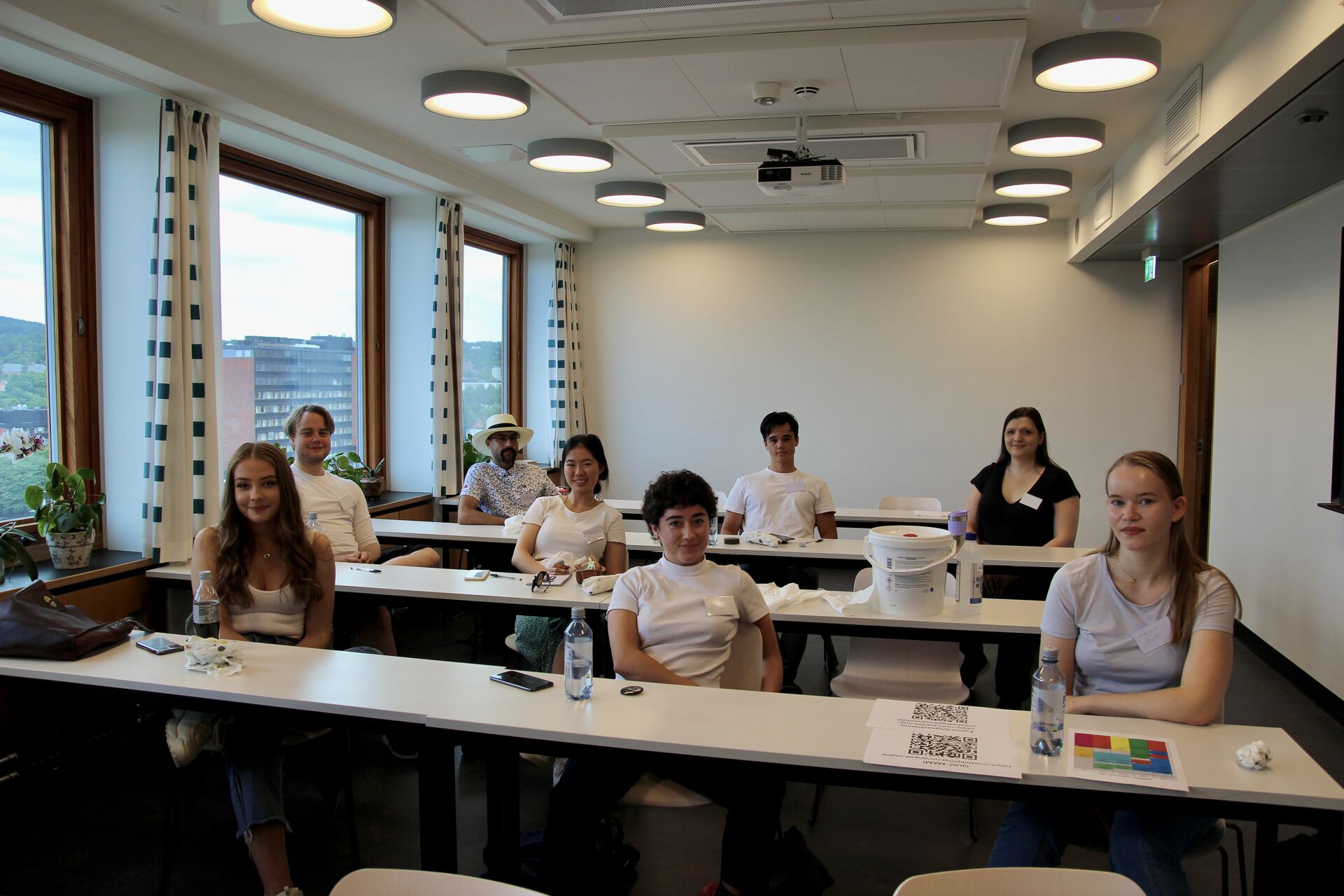
We work for research-based teaching and believe that this type of teaching benefits our students. We want to promote the activity at the department by organizing conferences and summer schools with international participation. One goal is to recruit younger employees with high professional ambitions. All employees will also disseminate their research widely.
The digital everyday life opens up new opportunities in teaching and education. Related to this there are also some new challenges. We see that digital access makes it easier for the students to not participate in the teaching. We work continuously with the development of student-active forms of learning and new teaching methods.
Our candidates are attractive in the job market as they have both good academic breadth and a wide specialization in mathematics, statistics or mechanics. We believe that the education combines specific knowledge with the development of generic, analytical skills in a unique way. This will be our trademark within education.
We are working on further development of our studies. Among other things we want to establish a professional study in actuarial science, which will link our courses even more closely to an important societal need.
We want to work for international student contact, such as Erasmus and other collaborations between universities on student exchange.
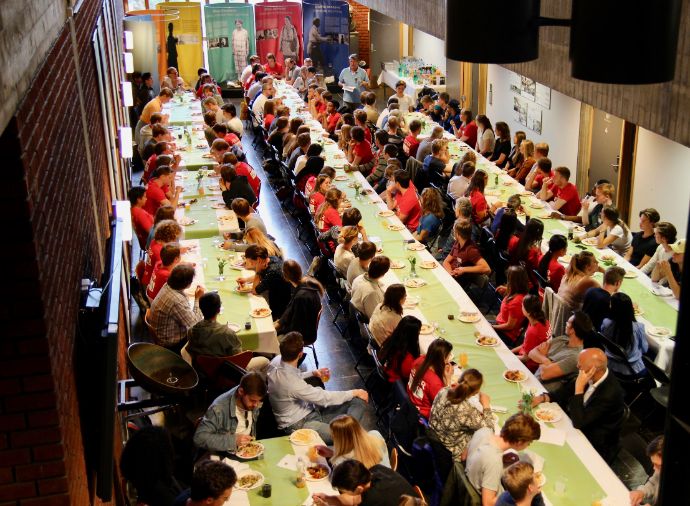
Research
Our other main area is research in mathematical fields. Our ambition is that we assert ourselves in the international top in several areas, and otherwise have a generally high level of research activity. We want to use our foremost strategic tool, namely recruitment to permanent scientific positions, so that it supports this ambition. Our employees must be active in the fight for research funding, both nationally and internationally. In particular, we always want to have at least one top-level research project within the ERC (European Research Council), as well as at least three NFR projects. We will also work to get a new center for outstanding research (SFF). The department had such a center, the Center of Mathematics for Applications (CMA) in the period 2003-2013. The department is a key participant in BigInsight, a center for research-driven innovation (SFI) in the period 2015-2023.
A major challenge for the department is that an increasing part of our finances is linked to external research projects. We must therefore position ourselves for applications in different directions. To systematize this process is something we highly emphasize.
Another challenge is that mathematical fields are specialized, and one do not know much about other people's fields of research. An active strategy is to connect fields where it is natural, and tools here are recruitment policy as well as seminars and initiatives related to research applications.

Plans and strategic thoughts at section level:
Mechanics: The section's strategy is to build comprehensive competence in several areas within fluid mechanics. Studies of multiscale phenomena will be central; processes from micro - to macro scale. The section has unique competence and facilities for studies in waves / wind / structures; biomechanics and microfluidics. New directions will be key themes within Ocean; waves / wind / ice, aquaculture, machine 13 learning / artificial intelligence; "flow control" and small-scale phenomena; bio-mimetics, soft surfaces and capillary flow, complex viscosity and microfluidics.
Risk and stochastics: Stochastic analysis, probability theory and statistics are the core of the activity. Analysis and applications of stochastic processes, both in time and space, are areas with strong focus. Furthermore, research is carried out on risk measures, optimal control, filter theory and stochastic (partial) differential equations. Going forward, the section will also focus on rough-path theory, stochastic volatility and machine learning. The section has an NFR Top-Level Research Project, led by Giulia Di Nunno, who will set the direction for large parts of the activity in the next four years.
Statistics and Data Science: The section develops theories, methods and algorithms for analyzing diverse complex data types. The research combines deep insight into statistical inference theory with challenges from new digital data sources, such as sensor, network and genomic data, images and text. The section focuses now and onwards on machine and statistical learning, on graphical, Bayesian, dependency, time and space, change and lifetime models, evaluation and choice of models and on computational methods. In particular, we will use statistical theory to improve machine learning methods, as well as develop scalable methods for large amounts of data. A lot of our activity is related to the SFI BigInsight until 2023. The section collaborates a great deal within UiO and with external partners. The section expects more collaboration with new data and problem owners, such as social sciences and linguistics, and is e.g., involved in CAS for 2022/23 together with PRIO. The section also plans to become an active, central part of the new dScience center at UiO.
Differential Equations and Computational Mathematics: Much of the research in partial differential equations is about showing well-posedness, ie the existence, uniqueness and possible stability of solutions of different, usually non-linear, PDEs. Related to this is also the analysis of numerical methods, including finite element methods, for these differential equations. Going forward, this activity will continue, but we plan to focus especially on PDEs with stochastic components. The department also houses research in artificial intelligence (AI), and we envisage that this activity will increase in the future. The research activity within splines will continue to be about the approach properties of spline spaces but will in the future to a greater extent focus on multidimensional splines. Within combinatorial matrix theory, the focus will be on majorization, schemes and spectral properties for Laplace matrices.
Algebra, geometry and topology: Research in algebra is focused on topics such as birational geometry, deformation theory, enumerative geometry, Calabi-Yau diversity, toral geometry, tropical algebra, and several related topics. The BFS project "Algebraic and topological cycles in tropical and complex geometry" and the NFR project "Positivity and geometry of higher codimension subvarieties" drive much of this research. In topology, the section is active in topics such as algebraic K-theory with applications in geometric topology, differential geometry, Floer homology and singularity theory. The top-level research project "Motivic Hopf Equations" relates homotopy type theory to algebraic geometry. International research programs, conferences and summer schools make a strong contribution to this activity.
Several Complex Variables, Logic and Operator Algebra: The research of the group in several complex variables is focused on holomorphic functions and maps, approximation theory, and embedding problems. Complex dynamics is also central, with issues taken from mathematical analysis, complex / algebraic geometry, topology and dynamic systems, as well as artificial intelligence. The group in operator algebras researches in several directions, i.e. non-commutative geometry for quantum groups, deformation theory, tensor categories, KMS states, group and semi-group C * -algebras, C * -dynamic systems, non-commutative Fourier analysis and quantum information theory. The logic group concentrates its research on computability theory, complexity theory and theoretical informatics. The groups have an extensive collaboration with many colleagues in Norway and abroad, and are active in sending in applications, something they also will focus on in the future (both to NFR and ERC). They also regularly arrange national meetings, conferences, workshops and research schools.
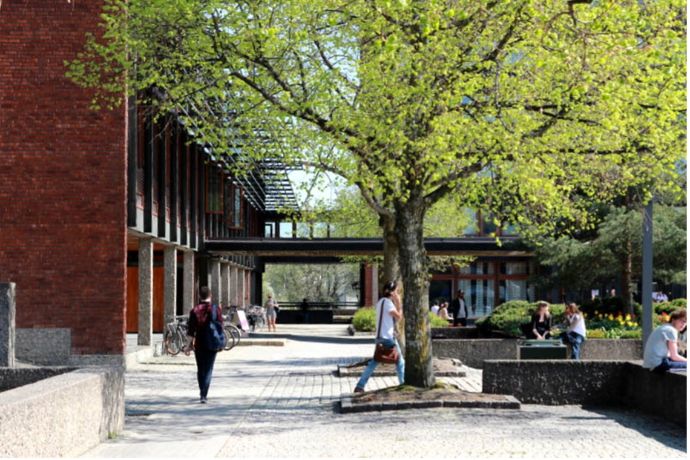
Interdisciplinary initiatives: The department will engage in interdisciplinary activities in collaboration with disciplines in natural sciences, informatics, medicine and other fields. In particular, our department will have an increasingly central role at the faculty since mathematical fields and calculations play a major role in many areas. Mathematical methods and calculations make it possible to analyze complex phenomena in new ways. The department was the initiator and central in the work with the new faculty center dScience, center for Computational and Data Science. Here, employees from several departments will meet for seminars, research collaboration and teaching in these discipline areas. Start-up is January 2021.
Research collaboration: Our employees have research collaboration with academic environments at a large number of universities around the world. As part of this, research visits are arranged, both ways, both for permanent employees, PhD-students and Postdocs. Furthermore, we are involved in the arrangement of international conferences and workshops, both at UiO and elsewhere.
The department follows Open Access principles in accordance with agreements for the universities and will also be able to support publication in leading journals that are not covered by current agreements.
External relations and dissemination
The Department of Mathematics has an important role as a social actor with the dissemination of our subjects and collaboration with business, administration and research institutions. We have close contact with other institutions and the business community, especially in areas such as
- risk and insurance, the actuarial association
- finance, insurance and banking
- energy companies, e.g., Statkraft, Equinor
- process industry: oil, gas, wind
- traffic analyzes
- maritime activities, e.g., DNV-GL and ABB
- medicine and health, Oslo University Hospital and the Norwegian Institute of Public Health social analyzes, Statistics Norway
We collaborate with research institutions such as SINTEF, the Norwegian Computing Center, SIMULA and others. We have a number of PhD students in collaboration with business and research institutions. The Academy agreement with Equinor has provided funding over a certain period for two new permanent positions. We have a desire to be more visible in dissemination towards schools and industry, through popular science lectures and course activities.

Dissemination: The Department of Mathematics arranges popular science lectures in various contexts. With this we want to reach a wider audience and contribute to interest in our courses. The department has several separate actions for students in upper secondary school. Every year, the department arranges “Fagdager”/ Math day where the students follow an academic program that lasts for six hours. Students who take R1 follow a scheme in geometry, while students who take R2 follow a scheme in differential equations. Between 400 and 500 students come to Blindern every year to participate. A Summer School is also arranged in collaboration with the education agency in Oslo. Here students who are to start on R1 or R2 can follow a weekly course on campus and thus get a jump start on the mathematics they will learn next school year.
The department has since 2012 had its own offer for upper secondary students who have pushed mathematics with at least one year, and who have obtained the grade 5 or 6. These students can take MAT1100U, a separate offer for upper secondary students, where the ordinary calculation course is offered as evening tuition over one year. From starting date in autumn of 2012 and up to and including the spring of 2019, about 250 students have taken the exam in MAT1100U. To ensure good contact with relevant schools and students, the department has established a good collaboration with the education authorities in Oslo and Viken. Students from other counties have also participated in the course. In addition to these regular events, the department receives school visits from classes or travels to classes that wish to hear one or more popular science lectures.
IMO - The International Mathematical Olympiad: The Department of Mathematics will in 2022 arrange the International Mathematical Olympiad (IMO). IMO is a "world championship" in mathematics for upper secondary students and was first held in Romania in 1959 with participants from 7 countries. The competition is held annually and now collects approx. 110 countries from 5 continents. The countries participate with up to six students plus the leader and deputy leader. Norway has participated since 1984 but has not previously hosted the IMO. The Norwegian team is put together based on the results of the Abel competition for upper secondary school. Norway has so far won 3 gold, 14 silver and 36 bronze medals.

.jpg?alt=thumbnail)
.jpg)
.jpg?alt=thumbnail)
.jpg?alt=thumbnail)
.jpg?alt=thumbnail)
.jpg?alt=thumbnail)
.jpg?alt=thumbnail)
.jpg)
.jpg?alt=thumbnail)
.jpeg?alt=thumbnail)
.jpg?alt=thumbnail)
.jpg?alt=thumbnail)
.jpg?alt=thumbnail)

.jpg?alt=thumbnail)
.jpg?alt=thumbnail)
.jpg?alt=thumbnail)
.jpg?alt=thumbnail)
.jpg?alt=thumbnail)
.jpg?alt=thumbnail)
.jpg?alt=thumbnail)
.jpg?alt=thumbnail)
.jpg?alt=thumbnail)
.jpeg?alt=thumbnail)